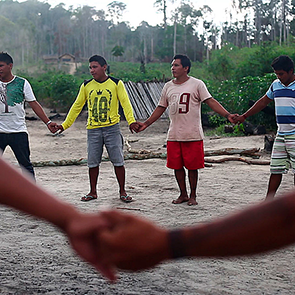
Ka'apor Indigenous People
The territory of the Ka'apor people was recognized in 1982. The indigenous land of Alto Turiaçu extends over 530 thousand hectares and is located on the border between the states of Maranhão and Pará in the Brazilian Amazon region. This territory is subject to constant illegal logging, mining and the expansion of agribusiness.
Since 2013, with the purpose of curbing invasions of the territory and illegal exploitation of the Amazon rainforest, the Ka'apor indigenous people have established zones of protection and agro-forestry production in the areas bordering the indigenous land, near to clandestine roads opened by illegal miners and loggers. These activities to protect the indigenous land have yet to be supported by any public body, including FUNAI, the Brazilian State's indigenist body responsible for enforcing the territorial rights of indigenous peoples. The actions of the Ka'apor communities throughout the territory have been contributing to the reforestation of the region, managing to recover around 80% of the degraded areas. Because of their work protecting the territory and the environment, representatives of the Ka'apor people have been constantly attacked and harassed by illegal loggers and miners.

